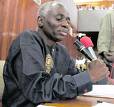
By William Yaw Owusu
Wenesday,December 20,2006
The Court of Appeal yesterday dismissed an appeal application filed by Mr. Tsatsu Tsikata, former Chief Executive of the Ghana National Petroleum Corporation (GNPC) that sought to ask the court to order the International finance Corporation (IFC) to testify in the case in which he is being tried for allegedly causing financial loss to the state.
It declared that the International Finance Corporation (IFC) has immunity from the country’s court processes.
The three member panel presided over by Mr. Justice S.E. Kanyoke unanimously dismissed all the grounds of appeal filed by Mr. Tsikata.
The panel which also included Justices Francis Kusi-Appiah and Annin Yeboah had earlier on dismissed an interlocutory appeal by Mr. Tsikata to make the IFC a necessary party to argue over its immunity issue in the substantive appeal process.
The Fast Track Court preside over by Mrs. Justice Henrietta Abban, also with the Court of Appeal on January 19,ruled that the trial court will not invite the IFC to testify in the case after Mr. Tsikata had said the IFC was a “desirable witness” and the refusal could be a “miscarriage of justice”.
The trial court initially subpoenaed the IFC but on the court day Mr. Kizito Beyuo, counsel for the IFC came to argue that they had immunity under Article 6 of Legislative Notification9 of 1958 and were not prepared to waive it. This was upheld by the court.
Dismissing the appeal, Justice Annin Yeboah who read the decision said the LN9 under which the IFC derived its immunity was unambiguous and clear, adding that the court was not persuaded enough on the challenge over the immunity issue by the applicant.
It said the court’s attention was not drawn on any law that could reverse the immunity issue of the IFC, adding that “IFC’s immunity is statutory conferred”.
The court further held that the fact that the IFC can sue and be sued did not deny the statutory obligation conferred on them.
It said when Mr. Tsikata asked that the IFC should come to testify, the trial judge readily issued the subpoena adding that “the judge performed her constitutional obligation and there was no violation of Article 19 (2) (g) as submitted by the appellant”.
Immediately the court gave its ruling, Prof. E.V.O Dankwa counsel for Mr. Tsikata filed a notice of appeal to challenge the court’s decision at the Supreme Court.
He argued that the Court of Appeal misconstrued the provisions in the LN9 of 1958 Article VI Section 8 as “providing immunity to the current Country Director of the IFC from being summoned to give evidence even though the testimony being sought by the defence did not relate to acts the Director”.
He said the Court of Appeal erred in failing to recognize and enforce the fundamental human rights of the accused expressed in clear mandatory language in Art. 19 (2)(g) of the Constitution.
He further submitted that the provisions in respect of the immunity of the IFC was misrepresented by the Appeal Court.
No comments:
Post a Comment